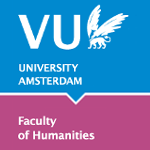Home page >
Digital humanities > Initiatives
Initiatives
Universities and research institutes all over the world have developed initiatives regarding digital humanities research and infrastructure. There are research centres, research groups, networks, journals and conferences. On this page we will mention a number of national and international platforms, of which the websites offer lots of information about the current state of affairs, trends and new developments. We also highlight a number of Dutch institutions that have a focus on digital humanities and digital humanities centres of universities.
 CLARIAH
CLARIAH
CLARIA (Common Lab Research Infrastructure for the Arts and Humanities) is a distributed research infrastructure for the humanities and the social sciences. CLARIAH's goal is to provide researchers with access to large collections of digital data and to innovative and user-friendly applications for the processing of these data. Both the data and applications will be managed in a sustainable manner so that they can also be useful for future researchers: from literary researchers, historians and archaeologists to linguists, speech technologists and media scientists. CLARIAH's website offers up to date news and an event calendar for those interested in digital humanities.
 The European Association for Digital Humanities (EADH)
The European Association for Digital Humanities (EADH)
The EADH brings together and represents the Digital Humanities in Europe across the entire spectrum of disciplines that research, develop, and apply digital humanities methods and technology. These include art history, cultural studies, history, image processing, language and literature studies, manuscripts studies, and musicology, amongst others.
 The Alliance of Digital Humanities Organizations (ADHO)
The Alliance of Digital Humanities Organizations (ADHO)
ADHO is a global organisation which promotes and supports digital research and teaching across all arts and humanities disciplines, acting as a community-based advisory force, and supporting excellence in research, publication, collaboration and training. On its website you will find information about major initiatives and conferences, but also about vacancies in the field.
 The National Library of the Netherlands (KB)
The National Library of the Netherlands (KB)
The KB is an active partner in international cooperative efforts to develop new knowledge and technology for the digital library. Focal points are: digital preservation, digitisation, copyright, web 2.0.(see Digital Humanities at the KB).
 eHumanities.nl
eHumanities.nl
The Netherlands Network for Humanities, Social Sciences and Technology eHumanities.NL, hosted by the Royal Academy of Sience (KNAW), is a national platform that brings together expertise and research in the development and use of digital technologies in the humanities and the social sciences. This has been the main overarching organization in the Netherlands for a number of years. Although it is not that active anymore, the website still supplies relevant information for those interested in digital humanities.
 KNAW Humanities Cluster
KNAW Humanities Cluster
Three major Dutch research institutes (Huygens ING, The Meertens Institute and The International Institute of Social History (IISH)) collaborate in the KNAW HUmanities CLuster. HuC has a Digital Humanities Lab, the misson of which is to advance the humanities through digital methods. DHLab is connecting different research departments at HuC and beyond through identifying shared research topics and fostering these connections through the application and development of digital research methods.
Digital humanities centres
 Many universities have digital humanities centres. At VU University, the Faculty of Humanities has a Computational Lexicology & Terminology Lab. The Amsterdam Data Science Centre (VU, UvA, HvA) has a Digital Humanities research discipline.
At other Dutch universities you can find the Leiden University Centre for Digital Humanities, the Utrecht Digital Humanities Lab, the Groningen Centre for Digital Humanities, and the eHumanities Team of Radboud University.
Many universities have digital humanities centres. At VU University, the Faculty of Humanities has a Computational Lexicology & Terminology Lab. The Amsterdam Data Science Centre (VU, UvA, HvA) has a Digital Humanities research discipline.
At other Dutch universities you can find the Leiden University Centre for Digital Humanities, the Utrecht Digital Humanities Lab, the Groningen Centre for Digital Humanities, and the eHumanities Team of Radboud University.





 The National Library of the Netherlands (KB)
The National Library of the Netherlands (KB)

 Many universities have digital humanities centres. At VU University, the Faculty of Humanities has a
Many universities have digital humanities centres. At VU University, the Faculty of Humanities has a